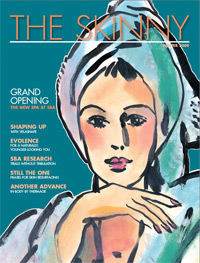from the Winter 2009 issue
Clinical research is an integral part of Suzanne Bruce and Associates. 2009 marks our 10th year conducting skin-related studies for major and emerging pharmaceutical companies. We help these companies; and the clinical research organizations, who often oversee their trials, test new oral and topical medications for conditions such as acne, actinic keratoses, hyperhidrosis, psoriasis and rosacea. All are seeking FDA approval. Some are new therapies and others are generic drugs. As a clinical research site, we are part of an important process, helping innovative remedies prove their worth and safety and make their way to market. We see our work with generics, when they make the grade, as a way to lower the cost of medication for consumers.
We also do cosmetic studies. We’ve conducted a variety of dermal filler trials – both permanent and temporary. These projects and our medical studies provide us the opportunity to see first-hand what’s new and innovative in dermatological science. But just as importantly, it gives our research patients a chance to advance science and possibly benefit from the therapies being tested. Like our medical and cosmetic patients, our clinical research participants receive excellent care and service. They can receive free skin exams from a dermatologist or physician assistant and usually undergo blood, electro-cardiogram and other tests – again at no charge. Sometimes these tests alert patients to an abnormality or other health issues that they were unaware of and that could negatively impact their lives.
There can be a natural aversion to being a study patient. There may be a concern about the safety of the trial. After all it’s a test medication. There may also be concerns about lack of information about the drug or being trapped in a trial once it begins. The first two are clearly, carefully addressed during a screening visit to see if you have the condition, or enough of the condition, to qualify for the study. Our clinical research coordinators (CRCs) go over the study with each patient. Before someone can join a trial, the individual must review a detailed informed consent with our CRCs and doctors or physician assistant about exactly what’s involved and what will happen during the study. The third concern is also addressed in the informed consent – that is, letting all participants know that they are free to leave a study at any time for any reason.
In 2008, our Center for Skin Research initiated 15 trials and continued work on seven others and four follow-ups. It was our busiest, most rewarding year ever. We added a third CRC, Amy Fletcher, a certified clinical research professional. We also hired our second research assistant, Nadia Nassaj. Both assistants work closely with our CRCs and the investigators in conducting and recording the results of our trials. We also hired a full-time recruiter, Deann Kaiser, to contact new and established patients who express an interest in participating in a particular study. Our long-time CRCs, Jasmine Leung and Sandy Nero, research assistant, Sue Shannon, investigators Suzanne Bruce, M.D., and April Harrison, PA-C, and our Director, Malcolm Waddell, round out our research team.

